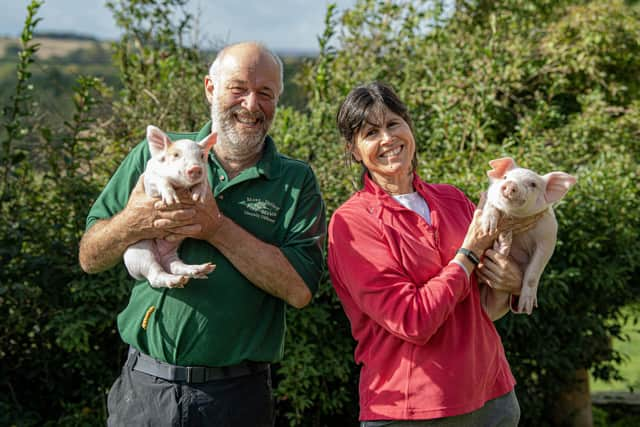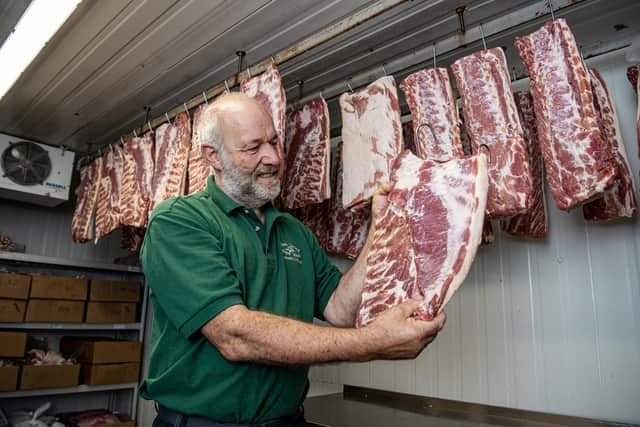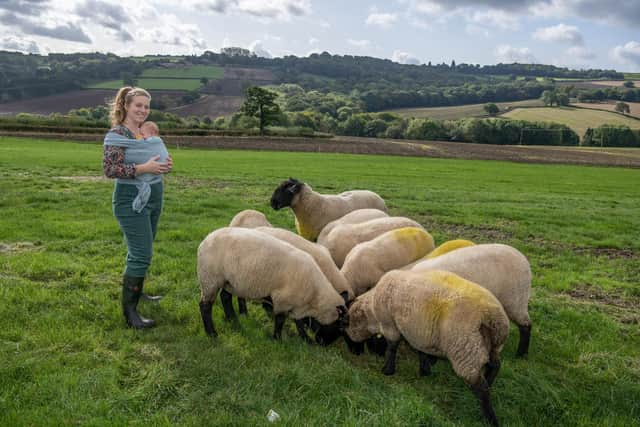Farm of the Week: Four generations of pig experts living and working at Moss Valley Fine Meats
Last week Karen and Stephen Thompson added to their impressive list of accolades when they picked up the Pig Farm of the Year title at the Yorkshire Post Rural Awards 2023 at the Pavilions of Harrogate.
Karen and Stephen began their tenure at Povey Farm when Stephen returned to the family farm in 1980 to take over from his mother Jean who had run the farm since his father Gordon had passed away when he was just 13 years old. He and Karen had met while they were both studying at Nottingham University and came back to the farm together.
Advertisement
Hide AdAdvertisement
Hide AdIn the past 40-plus years they have made various big decisions. Their first was to make the step into starting a sow herd, which they started with in 1982. It was their move into on-farm butchery and the retailing of their pork, which brought about their Moss Valley Fine Meats brand in 2007 and propelled them into the public eye.


“We farm 240 acres, growing crops that are mostly grown to feed the pigs and we have a herd of 200 sows and gilts,” says Karen, who is the livestock farmer that she’d always said she wanted to be from being seven years old, having grown up in Northumberland.
“We have around 2500 pigs on the farm at any one time with around 1000 weaners and growers, 1000 finishers and 300 suckling piglets.
“It’s a totally closed herd. We have high health status and our sows produce an average of 2.35 litters per year with a litter average about 15. We use Landrace-crossed-Large White sows on what you would call a criss-cross system. Nothing is ever 50-50 between the two. It’s all about the benefits you derive from that hybrid vigour.
Advertisement
Hide AdAdvertisement
Hide Ad“Karen runs the pig unit like clockwork,” says Stephen. “While I do the butchery side, any repairs that need doing and marketing us as Moss Valley Fine Meats. I enjoy talking to people.


“Our eldest son Oliver, of our three siblings, has recently come on board and is now running the arable side. He studied at Harper Adams. Everything we grow goes back to the pigs except the oilseed rape, which goes off to crushing for engine oil. We deal with a local company that manufactures it.
“This year we harvested 90 acres of winter wheat; 30 acres each of winter barley and oilseed rape; and 45 acres of rye. It was a difficult harvest, not least because the combine broke down twice, with the engine seizing up the second time. It is still in field waiting to be recovered. We are just starting to subsoil, ready for drilling, so a nice dry week would be good.
Future proofing the farm business was the original intention when looking into vertical integration of butchery and retail. There was also another reason for a shift in direction, as Karen explains.
Advertisement
Hide AdAdvertisement
Hide Ad“You always have choices. Ours were to expand the number of pigs we had, which would have increased the amount of mucking out that was required or to vertically integrate.


“I was fed up of mucking out pigs and hadn’t wanted to carry on doing it for another 20-plus years. That’s also why we dabbled with the idea of processing our own pork and how Moss Valley Fine Meats was born.
“In reality it’s not exactly how it’s turned out overall, because to market all the pigs you produce on a farm is very difficult to do. People have done it, but we haven’t ended up going wholly that way, and most of our pigs go to a big processor Cranswick, whose director Rick Buckle presented us with our award on Thursday.
“Around 80 per cent of our pigs go to Cranswick with the rest going into our own Moss Valley Fine Meats brand.
Advertisement
Hide AdAdvertisement
Hide AdStephen tells of the Moss Valley brand getting bigger by the year.
“We are expanding and now have three full-time butchers. Every week we are getting more customers. It’s a long process but we are going up slowly but surely.
“How we started was at Christmas 2006 when we made some ham and bacon and it went down a storm with friends. We thought we could try moving it along.
“We got some funding through Business Link for Karen to go on some butchery courses, learning how to make sausages, bacon and how to cut up a pig.
Advertisement
Hide AdAdvertisement
Hide AdHaving done so, Karen quickly decided that butchery was not for her and the die was cast that she would carry on running the pig farming operation, including the mucking out, and Stephen would focus on the butchery and retail side.
“My immediate decision was that it wasn’t okay for me to take three days to cut up a pig and it would be better to get a butcher to do it,” says Karen.
“That’s what we did, but at least I knew what to do and how it all worked and we developed sausage recipes. What we did then, at the start, we still do now fundamentally. We dry cure bacon the same way, we’ve changed sausage recipes slightly, but the principles are similar.
Stephen says that the way they have approached the retail market has stood them in good stead.
Advertisement
Hide AdAdvertisement
Hide Ad“Our initial idea was to sell direct to the public and we still do that, but our main focus today is to sell to cafés, restaurants and delis because although you have slightly lower margins you have a bigger move through of pork.
Oliver is now the fifth generation to farm at Povey. He and his wife Beth have just had a little boy Leo, born a month ago. Beth also has a pedigree flock of MV accredited Suffolks.
“We currently have four generations living here,” says Stephen. “My mum Jean lives in a house on the farm. Our other two children are Mark who works in London and Katie who is just completing her studies at university.
Having started with 100 sows and gilts in 1982 and having moved up to 200 in 1991 the Thompsons have lived through a number of highs and lows including the dark days of foot and mouth which scuppered a hoped for move into export of breeding stock and more recently, poor prices in the past three years.
Advertisement
Hide AdAdvertisement
Hide AdKaren tells of what could be a gamechanger in future, for all farms with sows and gilts, that will need addressing due to its significant impact.
“Loose lactation pens rather using traditional farrowing accommodation could change things. These will mean the sows get more space to move around and turn around while still protecting the piglets.
“Keeping piglet mortality rate low will be a concern. You don’t want to lose piglets at the expense of the sow’s freedom. The investment costs are serious. The British pig industry has suffered greatly with terrible negative margins and investment in new buildings will be needed. There needs to be some help from Government.